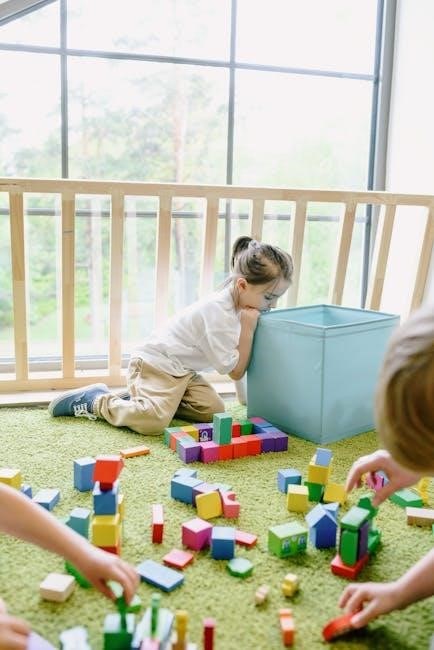
stregthening families program activities pdf
Download Strengthening Families Program activities PDF. Explore expert guides, proven strategies, and resources to support family well-being.
The Strengthening Families Program is an evidence-based initiative designed to enhance family communication‚ bonding‚ and parenting skills‚ targeting families with children aged 7-17 through interactive activities and skill-building exercises․
1․1 Overview of the Program Objectives
The Strengthening Families Program aims to prevent teen substance abuse‚ improve parent-youth communication‚ and promote pro-social skills․ It focuses on building resilience‚ setting clear boundaries‚ and fostering positive relationships through interactive activities and skill-building exercises‚ ultimately enhancing family dynamics and reducing risk factors for problematic behaviors;
1․2 Target Age Group and Family Involvement
The program targets families with children aged 7-17‚ emphasizing active participation from both parents and youth․ It involves separate sessions for parents and children‚ followed by combined activities to foster bonding․ Family involvement is crucial‚ with engaging exercises like games and role-playing to enhance communication and problem-solving skills‚ ensuring all members contribute to a supportive environment․

Core Components of the Program
The program includes separate sessions for parents and youth‚ followed by combined activities․ Each two-hour session focuses on enhancing communication‚ setting boundaries‚ and fostering family bonding through interactive games and discussions․
2․1 Parent and Youth Separate Sessions
The program begins with separate sessions for parents and youth‚ each lasting one hour․ Parents focus on communication skills and setting boundaries‚ while youth engage in activities aimed at developing social skills and problem-solving abilities․ These sessions are designed to address specific needs and prepare participants for the combined family activities that follow‚ fostering a stronger‚ more supportive family environment․
2․2 Combined Family Activities
The second hour of each session brings parents and youth together for interactive games‚ discussions‚ and collaborative problem-solving․ These activities reinforce skills learned in separate sessions‚ fostering communication and bonding․ Families engage in fun‚ structured exercises designed to strengthen relationships and apply newfound strategies‚ guided by trained facilitators to ensure meaningful engagement and progress toward program goals․

Activities Designed for Parents
The program includes sessions focused on effective communication‚ setting clear family rules‚ and monitoring activities to help parents create a supportive environment․
3․1 Skills Training for Effective Communication
The program focuses on enhancing parental communication skills through role-playing‚ active listening exercises‚ and discussions․ Parents learn to express feelings clearly‚ set expectations‚ and engage in collaborative problem-solving․ These activities foster open dialogue‚ reduce conflict‚ and strengthen emotional bonds between parents and youth‚ promoting a supportive family environment․ Evidence-based techniques ensure lasting improvements in interpersonal connections and understanding․
3․2 Setting Clear Family Rules and Boundaries
Parents learn to establish clear‚ consistent family rules and consequences‚ fostering a structured environment․ Activities include defining expectations‚ monitoring compliance‚ and enforcing fair discipline․ This helps reduce risky behaviors and promotes responsibility․ Role-playing exercises and group discussions provide practical strategies for maintaining boundaries while encouraging open communication and mutual respect within the family dynamic․

Activities Focused on Youth Development
The program includes role-playing‚ goal-setting exercises‚ and pro-social skills training to help youth develop positive behaviors and decision-making abilities‚ fostering personal growth and resilience․
4․1 Pro-Social Skills and Goal Setting
Activities focus on teaching youth pro-social skills‚ such as cooperation and empathy‚ through interactive exercises and role-playing․ Goal-setting techniques empower them to create achievable objectives‚ fostering self-confidence and a sense of accomplishment․ These sessions are designed to help young individuals develop positive behaviors and life skills that contribute to their overall development and future success․

4․2 Role-Playing and Peer Resistance Techniques
Role-playing activities help youth practice real-life scenarios‚ such as resisting peer pressure‚ through interactive and engaging exercises․ These techniques build confidence and decision-making skills‚ enabling young individuals to navigate challenging situations effectively․ Puppet shows and group discussions further reinforce these lessons‚ providing practical tools to avoid negative influences and make positive choices in their daily lives․
Family Interaction and Bonding
Family interaction and bonding are fostered through engaging activities like collaborative games‚ discussions‚ and shared projects‚ strengthening relationships and creating lasting connections among family members․
5․1 Fun and Engaging Family Games
Fun and engaging family games are a cornerstone of the Strengthening Families Program‚ fostering bonding through interactive activities like board games‚ puzzles‚ and role-playing․ These exercises promote teamwork‚ communication‚ and problem-solving while creating a relaxed environment for families to connect․ By incorporating laughter and collaboration‚ these games help build trust and strengthen relationships‚ making them a vital component of the program’s approach to family unity and resilience․
5․2 Collaborative Problem-Solving Exercises
Collaborative problem-solving exercises encourage families to work together on challenges‚ fostering open communication and mutual understanding․ These activities‚ often involving role-playing or group tasks‚ help parents and youth develop practical solutions to real-life issues․ By addressing problems collectively‚ families build resilience‚ enhance decision-making skills‚ and strengthen their ability to support one another in a constructive and empathetic manner․

Protective Factors for Family Strengthening
Protective factors‚ such as parental resilience and positive family relationships‚ are cultivated through program activities‚ reducing risks and promoting a supportive environment for family growth and well-being․
6․1 Building Parental Resilience
Building parental resilience is a cornerstone of the Strengthening Families Program‚ achieved through stress management techniques‚ goal-setting‚ and coping strategies․ Activities include role-playing exercises‚ group discussions‚ and workshops that empower parents to handle challenges effectively‚ fostering a stable and nurturing home environment for their children’s development and well-being․
6․2 Promoting Positive Family Relationships
Positive family relationships are cultivated through collaborative activities‚ open communication‚ and shared goals․ Families engage in bonding exercises‚ such as structured games and problem-solving tasks‚ fostering trust and mutual respect․ These interactions strengthen emotional bonds‚ reduce conflict‚ and create lasting connections among family members‚ promoting a supportive and loving environment for personal and collective growth and development․

Community Involvement and Support
The program collaborates with schools and local organizations to provide resources‚ support‚ and activities‚ fostering a network that strengthens families and promotes positive community engagement and development․
7․1 Collaborating with Schools and Local Organizations
The Strengthening Families Program partners with schools and local organizations to provide families with accessible resources and support․ These collaborations often include hosting workshops‚ providing educational materials‚ and facilitating access to community services․ By working together‚ the program ensures families receive comprehensive support‚ improving communication and fostering a stronger‚ more resilient family environment through collective community efforts and shared goals․
7․2 Providing Resources for Families
The Strengthening Families Program offers a variety of resources to support family well-being․ These include educational handouts‚ activity guides‚ and access to community services․ Resources are designed to enhance parenting skills‚ improve communication‚ and promote positive family interactions․ Additionally‚ the program provides tools for setting family goals and managing challenges‚ ensuring families have the support needed to thrive and build a stronger‚ more resilient home environment․

Measuring Program Success
The program’s success is measured through assessments‚ surveys‚ and feedback‚ evaluating improvements in family communication‚ youth behavior‚ and parental skills over time․
8․1 Assessing Risk and Protective Factors
The program evaluates risk factors like substance use and protective factors such as family communication and rule enforcement․ Assessments identify strengths and challenges‚ guiding tailored interventions to reduce risks and enhance resilience‚ ensuring families receive targeted support for healthier outcomes․
8․2 Evaluating Family Communication Improvement
Evaluating communication improvement involves pre- and post-program surveys assessing changes in family interaction and conflict resolution․ Observations of family sessions and role-playing activities provide insights into enhanced expression of feelings and problem-solving skills‚ ensuring measurable progress in fostering open and supportive communication within families․

Case Studies and Success Stories
Real-life examples highlight families achieving positive transformations through improved communication and bonding․ Testimonials share heartfelt stories of strengthened relationships and lasting behavioral changes in both parents and youth․
9․1 Real-Life Examples of Family Transformation
The Strengthening Families Program has empowered numerous families to foster healthier relationships and behaviors․ One family reported improved communication‚ reducing conflicts and enhancing trust․ Another shared how the program helped their teen refrain from substance use through proactive parenting strategies․ These stories illustrate the program’s lasting impact on family dynamics and resilience‚ showcasing real-world success in nurturing positive change and empowered relationships․
9․2 Participant Feedback and Testimonials
Participants consistently praise the Strengthening Families Program for its positive impact․ Parents often highlight improved communication and conflict resolution skills‚ while youth appreciate the engaging activities and supportive environment․ Many families report stronger bonds and increased confidence in navigating challenges․ Testimonials frequently emphasize the program’s practical strategies and lasting benefits‚ noting how it has helped them build a more resilient and loving family dynamic․
The Strengthening Families Program has proven effective in enhancing family dynamics and reducing risk factors․ Future efforts aim to expand its reach and continuously refine its strategies to meet evolving family needs․
10․1 Expanding the Program Reach
Efforts to expand the Strengthening Families Program involve increasing accessibility through partnerships with schools‚ community organizations‚ and online platforms․ The program aims to reach diverse populations by translating materials and training facilitators․ By leveraging technology and cultural adaptations‚ the initiative seeks to ensure all families can benefit‚ fostering resilience and positive relationships across different communities and backgrounds․

10․2 Continuous Improvement and Adaptation
The Strengthening Families Program undergoes regular updates to meet evolving family needs․ Feedback from participants and facilitators drives program enhancements․ Adaptations include incorporating new technologies‚ addressing cultural diversity‚ and integrating emerging best practices․ Continuous evaluation ensures the program remains effective‚ relevant‚ and responsive to the changing dynamics of modern families and their unique challenges․